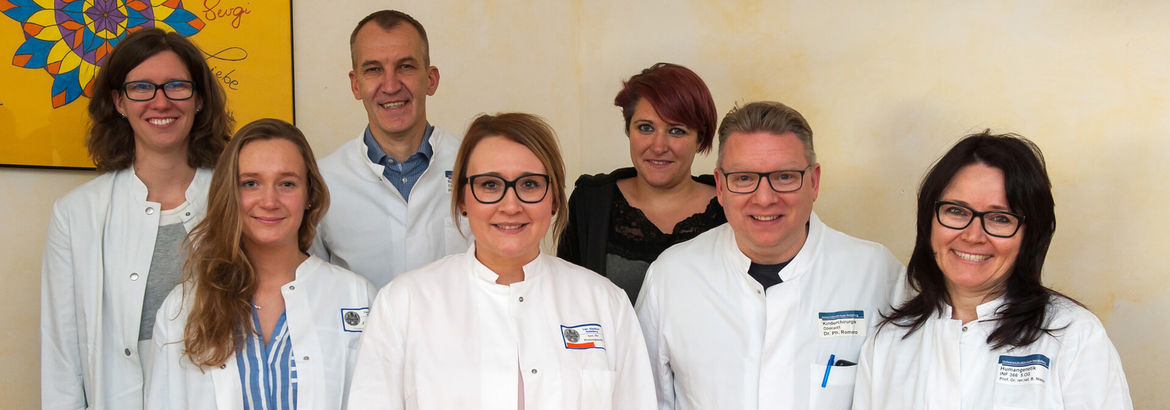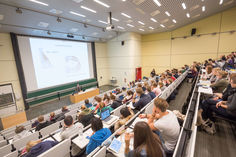Genetics of Hirschsprung Disease
Research Group

The HSCR team Heidelberg 2019 from left to right: Dr. Tanja Mederer (former team member), Denise Dawid, Prof. Patrick Günther (Head of Section Paediatric Surgery UniKlinikum Heidelberg), Dr. Stefanie Schmitteckert, Leonie Carstensen (former team member Section Paediatric Surgery UniKlinikum Heidelberg), Dr. Philipp Romero (Senior physician Section Paediatric Surgery UniKlinikum Heidelberg), Prof. Beate Niesler.
Research Focus
Hirschsprung disease (HSCR) represents a congenital neurodevelopmental disorder and the major genetic cause of functional intestinal obstruction in early childhood. It is characterized by an absence of neurons in distinct parts of the colon (aganglionosis). The only treatment so far represents the surgical resection of the aganglionic gut segment. All children with HSCR are at risk for postoperative faecal incontinence, enterocolitis and obstructive symptoms.
HSCR is caused by a failure in proliferation, survival, migration or differentiation of enteric neural crest-derived cells. It has a multifactorial origin and a sex-dependent penetrance. Currently, at least 25 genes have consistently been replicated in HSCR. Research on the complex underlying genetic mechanisms and accompanying postoperative impairment is still in its infancy. To dissect the individual genetic background of HSCR and its lifelong complications, we established a complementing research approach. Our study pipeline not only allows the identification but also the interpretation of genetic findings by the application of cell models mimicking individual pathomechanisms. This permits insight into consequences of genetic alterations on molecular and functional level.
In a recent pilot study, we identified the four novel HSCR candidate genes: ATP7A, ABCD1, PIAS2 and SREBF1. To further explore their causative relevance, a complementing pipeline was applied including comparative expression analyses in man and mouse, CRISPR/Cas-based gene editing, as well as morphological and functional in vitro analyses (Mederer, Schmitteckert et al., 2020).
We aim not only to contribute to the understanding of the molecular causes of HSCR and its lifelong bowel complaints, but also to facilitate the development of HSCR diagnostics in the future. In addition, the gained knowledge might change the current treatment regime of HSCR: a correlation of persistent disturbances in gut motility and novel HSCR candidate genes could adjust the treatment and diagnostics order of paediatric gastroenterologists and surgeons. In order to collect as detailed information as possible about underlying pathomechanisms and the individuals’ genetic burden, we joined forces and founded in 2018 the HSCR consortium Heidelberg-Mannheim-Basel.
OUR COLLABORATORS
SELBSTHILFE FÜR MENSCHEN MIT ANOREKTAL-FEHLBILDUNGEN UND MORBUS HIRSCHSPRUNG - SOMA
Funding bodies
„Ein Herz für Kinder“ – BILD hilft e.V.
back to Genetics of Neurogastroenterologic Disorders (AG Niesler)
![[Translate to English:] [Translate to English:]](/fileadmin/_processed_/8/2/csm_20131204_Beratung_035_a396c6c6e5.jpg)
![[Translate to English:] [Translate to English:]](/fileadmin/_processed_/a/0/csm_20170627_PflegeOrtho_001_fb912471fa.jpg)
![[Translate to English:] [Translate to English:]](/fileadmin/_processed_/f/c/csm_20170215_LaborOMZ_155_c0169c0898.jpg)
![[Translate to English:] [Translate to English:]](/fileadmin/_processed_/2/c/csm_20180523_Labor_139_6ebb9a0a1b.jpg)
